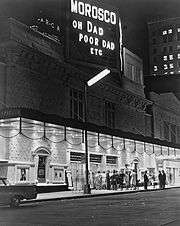Morosco Theatre
|
| |
| Address |
217 West 45th Street New York City United States |
|---|---|
| Coordinates | 40°45′29″N 73°59′08″W / 40.75801°N 73.98567°WCoordinates: 40°45′29″N 73°59′08″W / 40.75801°N 73.98567°W |
| Type | Broadway |
| Construction | |
| Opened | February 5, 1917 |
| Demolished | 1982 |
| Architect | Herbert J. Krapp |
The Morosco Theatre was a Broadway theatre near Times Square in New York City from 1917 to 1982. It housed many notable productions and its demolition, along with four adjacent theaters, was controversial.[2][3]
History
Located at 217 West 45th Street, the Morosco Theatre was designed by architect Herbert J. Krapp for the Shuberts, who constructed it for Oliver Morosco in gratitude for his helping them break the monopoly of the Theatrical Syndicate. It had approximately 955 seats. After an invitation-only preview performance on February 4, 1917, it opened to the public on February 5. The inaugural production was Canary Cottage, a musical with a book by Morosco and a score by Earl Carroll.[2][3][4]
The Shuberts lost the building in the Great Depression, and City Playhouses, Inc. bought it at auction in 1943. It was sold in 1968 to Bankers Trust Company[2] and, after a massive "Save the Theatres" protest movement mounted by various actors and other theatrical folk failed,[5][6][7][8][9] it was razed in 1982, along with the first Helen Hayes, the Bijou, and remnants of the Astor and the Gaiety theaters; it was replaced by the 49-story Marriott Marquis hotel and Marquis Theatre.[4]
Notable productions

- Happy New Year, a musical adaptation of the Philip Barry play Holiday with songs by Cole Porter, 1980
- The Lady From Dubuque by Edward Albee, 1980
- Da by Hugh Leonard, 1978
- Side By Side By Sondheim, a musical revue, 1978
- Golda by William Gibson, 1977
- The Shadow Box by Michael Cristofer, 1977
- A Party with Betty Comden and Adolph Green, a musical revue, 1977
- The Innocents by William Archibald, 1976
- Let My People Come by Earl Wilson Jr., 1976
- The Eccentricities of a Nightingale by Tennessee Williams, 1976
- The Norman Conquests by Alan Ayckbourn, 1975
- In Praise of Love by Terence Rattigan, 1974
- A Moon for the Misbegotten by Eugene O'Neill, 1973
- The Changing Room by David Storey, 1973
- Butley by Simon Gray, 1972
- And Miss Reardon Drinks a Little by Paul Zindel, 1971
- Forty Carats by Jay Allen, 1968
- The Price by Arthur Miller, 1968
- Don't Drink the Water by Woody Allen, 1966
- Mary, Mary by Jean Kerr, 1964
- Alfie! by Bill Naughton, 1964
- Three Sisters by Anton Chekhov, 1964
- The Milk Train Doesn't Stop Here Anymore by Tennessee Williams, 1963
- The Best Man by Gore Vidal, 1960
- The Visit by Friedrich Dürrenmatt, 1958
- Time Remembered by Jean Anouilh, 1957 – 1958
- Major Barbara by George Bernard Shaw, 1956
- Cat on a Hot Tin Roof by Tennessee Williams, 1955
- The Deep Blue Sea by Terence Rattigan, 1952
- Death of a Salesman by Arthur Miller, 1949
- The Voice of the Turtle by John William Van Druten, 1943
- Blithe Spirit a farce by Noël Coward, with Clifton Webb, 1941
- Old Acquaintance by John Van Druten, 1940
- Our Town by Thornton Wilder, 1938
- A Doll's House by Henrik Ibsen, 1937
- Gold Eagle Guy by Melvin Levy, 1934
- Camille by Alexandre Dumas, fils, 1932
- Uncle Vanya by Anton Chekhov, 1929
- Little Accident by Floyd Dell and Thomas Mitchell 1928
- The Letter by W. Somerset Maugham, 1927
- Craig's Wife by George Kelly, 1925
- Scaramouche by Rafael Sabatini, 1923
- Beyond the Horizon by Eugene O'Neill, 1920
- The Bat by Mary Roberts Rinehart and Avery Hopwood, 1920
References
Notes
- ↑ The sign refers to Arthur Kopit's comedy, Oh Dad, Poor Dad, Mamma's Hung You in the Closet and I'm Feelin' So Sad, which ran at the Morosco from August 27 to October 5, 1963. (Oh Dad, Poor Dad, Mamma's Hung You in the Closet and I'm Feelin' So Sad at the Internet Broadway Database)
- 1 2 3 Morosco Theatre at the Internet Broadway Database
- 1 2 The New York Times (February 5, 1917). "Morosco Theatre Opens Its Doors"
- 1 2 Morrison, William (1999). Broadway Theatres: History and Architecture (trade paperback). Dover Books on Architecture. Mineola, New York: Dover Publications. p. 101. ISBN 0-486-40244-4.
- ↑ The name of the organization was "Save the Theatres, Inc., as noted in court papers. See Shubert Organization, Inc. v. Landmarks Preservation Commission of the City of New York and Save the Theatres, Inc., Supreme Court of New York, Appellate Division, First Department, May 16, 1991, accessed March 10, 2013
- ↑ "Proposal to Save Morosco and Helen Hayes Theaters", LHP Architects, accessed March 10, 2013
- ↑ Helen Epstein. Joe Papp: An American Life. Retrieved February 22, 2013.
- ↑ "City Panel Near Vote On Save-The-Theaters Proposals". New York City: NYTimes.com. April 15, 1984. Retrieved February 22, 2013.
- ↑ Corwin, Betty "Theatre on film and tape archive", International Association of Libraries and Museums of the Performing Arts, accessed May 10, 2013
External links
| Wikimedia Commons has media related to Morosco Theatre. |
